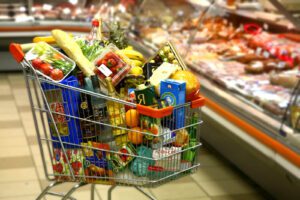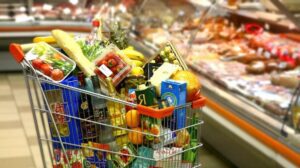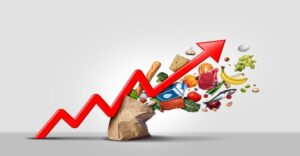
Global food prices in 2022 compared to 2021 rose by 14.3%, according to the FAO (Food and Agriculture Organization of the United Nations).
The FAO food price index was 132.4 points in December, down 1.9 percent from November. The decline has been going on for nine months. Compared to December 2021, the index was 1 percent lower. “The decrease in the index in December compared to November was due to a sharp fall in global vegetable oil prices along with some declines in grain and meat prices. However these were partly counterbalanced by modest increases in sugar and dairy prices,” the FAO survey said.
Cereal price index in December compared to November decreased by 1.9%, but it was 4.8% higher than in December 2021. For 2022, the Cereal Price Index reached a new record of 154.7 points and was 17.9% higher than in 2021. It was also 8.8% higher than the highest annual average in 2011. In 2022, global corn and wheat prices reached a new record high and were 24.8% and 15.6%, respectively, above the 2021 average.
The vegetable oil price index fell 6.7% in December compared to November and was the lowest since February 2021. This is due to the fall in world prices of palm, soybean, rapeseed and sunflower oils, explained in the review. In addition, a decrease in world quotations of vegetable oils was contributed by reduction of prices for crude oil.
At the end of 2022, the vegetable oil price index was 187.8 points, which is 13.9% higher than in 2021, and was the highest annual average.
The price index for dairy products in December was 1.1% higher than in November. It rose after five months of decline and was 7.9% higher than in December 2021. At the end of 2022, the index was 142.5 points, up 19.6% from 2021. This is the highest figure since 1990.
The Meat Price Index in December was 1.2% lower than in November. The decline has been going on for six months. But compared to December 2021, the index was 2.5% higher. “The decrease in the index in December was due to a drop in world beef and poultry prices, which was partially offset by an increase in pork and lamb prices,” the survey said. At the end of the year, the index was 118.9 points, 10.4 points higher than in 2021. It was the highest since 1990.
The sugar price index in December compared to November rose by 2.4%. The increase continues for a second month, with prices reaching their highest level in six months. At the end of 2022, the index was 114.5 points, up 4.7% from 2021. This is the highest figure since 2012.
The FAO Food Price Index is a weighted average that tracks the international price movements of five major food commodity groups.

In Ukraine, with the start of the Russian military invasion, food prices rose by at least 20%, and in late autumn they will rise by another 10-15% due to the inflationary weakening of the hryvnia, disruption of supply chains, rising fuel prices, energy and storage costs.
The corresponding forecast was announced by the Deputy Head of the All-Ukrainian Agrarian Rada Denis Marchuk during the broadcast at the Ukraine Media Center.
“Now is August, the vegetable harvest season, so we are seeing a decrease in prices due to an increase in supply. Potatoes, cucumbers, tomatoes and other vegetables have fallen in price, the seasonal factor will last until October. Considering that a certain number of Ukrainians went abroad, this also contributed to a decrease in prices for seasonal vegetables. But in the fall, the cost of storing vegetables will increase, so we should expect a 10-15% increase in prices for all groups after October,” Marchuk said during his speech.
The deputy head of the VAR recalled that the population of Ukraine spends more than half of its income on food, which has risen in price by at least 20% since the beginning of the war due to inflation, disruption of food supply chains, rising prices for fuel, energy and storage costs.

World food prices in July decreased by 8.6% compared to June. This is the sharpest decline since October 2008, according to the FAO (Food and Agriculture Organization of the United Nations).
The decline continues for the fourth month in a row after the historical maximum recorded in March.
The FAO Food Price Index stood at 140.9 in July, down 8.6% from its June level. However, it is still 13.1% higher than in July last year. “The fall in the index in July was the sharpest since October 2008 and was driven by large declines in vegetable oil and cereals price indices and somewhat smaller declines in sugar, dairy and meat price indices,” the FAO said in a survey.
The grain price index in July decreased by 11.5% compared to June, but remained 16.6% higher than in July 2021. In part, prices fell in July due to an agreement reached between Ukraine, Russia, Turkey and the UN to resume grain exports from Ukraine. In addition, the start of harvesting in the Northern Hemisphere contributed to lower prices. At the same time, international wheat prices are still 24.8% higher than in July last year.
“International prices for feed grains also continue to show a downward trend for the fourth month in a row: they fell by 11.2% compared to June, but remain 12.1% higher than last year. The main reason for the fall in world prices for corn by 10, 7% was the conclusion of an agreement to unblock Ukrainian ports. The seasonal increase in supply in Argentina and Brazil also contributed to the decline in prices, where harvesting is ahead of last year’s figures,” the report says.
The price index for vegetable oils in July fell by 19.2%, to its lowest level in the last 10 months. “Such a sharp drop was caused by a decline in world prices for palm, soybean, rapeseed and sunflower oils,” the document explains. Moreover, despite the ongoing uncertainty with logistics in the Black Sea region, international prices for sunflower oil have significantly decreased against the backdrop of a reduction in import demand in the world as a whole. The decrease in world quotations of vegetable oils was also facilitated by the reduction in prices for crude oil.
The price index for dairy products last month decreased by 2.5% compared to June, and increased by 25.4% compared to July last year. International quotations of skimmed milk powder, as well as butter and whole milk powder, fell the most, due to weak market activity in Europe due to the onset of the summer holiday period, FAO experts explained. At the same time, world cheese prices remained stable, as strong domestic sales in European tourist destinations offset weak import demand in international markets.
The Meat Price Index fell 0.5% in July, the first drop after a continuous six-month rise.
The sugar price index in July decreased by 3.8% compared to June. The decline continues for the third month in a row and reached the lowest value in the last five months, the review explains. “International sugar quotations were affected by concerns about the expected further slowdown in the global economy in 2022 and the resulting decrease in demand. In addition, the weakening of the exchange rate of the Brazilian real against the US dollar and the reduction in ethanol prices, which led to an increase in the volume of sugar production in Brazil in the first half of July compared to previous forecasts. Prices were also affected by favorable forecasts for sugar production in India and a possible increase in its exports. However, concerns about the impact of prolonged hot and dry weather on crops in the European Union prevented prices from dropping even lower, the document says.
The FAO Food Price Index is a weighted average that tracks international price movements for five major food commodity groups.

Rising food prices are explained by speculative transactions of some market players, said UN Special Rapporteur on extreme poverty and human rights Olivier de Schutter.
“The real reason for the rise in prices is not that there is not enough food. The real problem is the panic that grips the markets because we do not know when this conflict in Ukraine will end. And some financial players are profiting from this uncertainty by speculating on growth, mechanically provoking it,” the expert said on Friday in an interview with the Belgian francophone radio station La Premiere.
According to him, it is necessary to calm the markets. “We need more transparency about the state of stocks. The bulk of food reserves are in the hands of private operators, large grain traders who are not involved in the exchange of information that governments need to calm the nervousness of the markets,” de Schutter explained.
According to him, “five or six companies control 80% of the world’s grain transactions and own the bulk of stocks.” But they do not publish data on the state of their reserves. Opacity persists, and this gives rise to speculation, said the UN Special Rapporteur.
“Markets anticipate growth and create speculative bubbles – this is the main explanation for the rise in food prices in world markets,” said de Schutter.
He said that in a number of countries, such as Ethiopia, South Sudan, Nigeria, Yemen, Afghanistan, Somalia, “the risk of starvation is increasing from hour to hour.” “Unfortunately, the international community does not have the means to respond, and there is every reason to be concerned about the two dozen countries pointed out by the Food and Agriculture Organization of the United Nations (FAO) and the UN World Food Program (WFP),” he said.
De Schutter said that “no conclusions have been drawn from the crisis of 2007-2008” and today the international community is still not ready for cases when a humanitarian crisis is brewing.
“750 thousand people are in a situation of hunger, of which 400 thousand are only in the Tigray region (northern Ethiopia). In principle, it is necessary to have reserves so that the WFP can immediately come to the aid of this population. Instead, international agencies should knock on doors donors, and it takes two to three months for them to wake up and disburse the money.Then you need to determine where the food shipments can be purchased, and you still need to deliver them to the places of danger.All this takes up to six months.During this time, the population either either dying out or moving,” the UN Special Rapporteur outlined the situation.
Professor Olivier de Schutter (Belgium) was appointed as the UN Special Rapporteur on extreme poverty and human rights by the Human Rights Council at its 43rd session in March 2020. He was Special Rapporteur on the right to food from 2008 to 2014. and member of the Committee on Economic, Social and Cultural Rights from 2015 to 2020. Prior to his appointment to these positions, he served as Secretary General of the International Federation for Human Rights (FIDH).